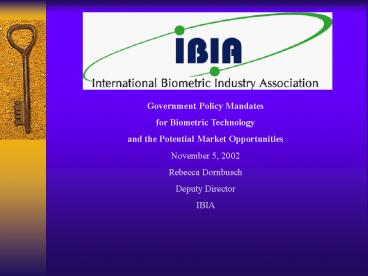Government Policy Mandates - PowerPoint PPT Presentation
1 / 8
Title:
Government Policy Mandates
Description:
Funding for projects Congressional inabilities to pass the required thirteen ... Congressional focus on social and legal implications of biometric adoption ... – PowerPoint PPT presentation
Number of Views:68
Avg rating:3.0/5.0
Title: Government Policy Mandates
1
Government Policy Mandates for Biometric
Technology and the Potential Market
Opportunities November 5, 2002 Rebecca
Dornbusch Deputy Director IBIA
2
- Biometric Legislation in the 107th Congress Prior
to September 11th - H.R. 2276 and S. 1400 Congressman Gekas and
Senator Kyl companion bills extending the
deadline to require border-crossing cards which
contain a biometric identifier. - Biometric Legislation in the 107th Congress After
September 11th - 17 bills and one amendment introduced.
- 3 of those bills signed into law the USA PATRIOT
Act, the Aviation and Transportation Security
Act, and the Enhanced Boarder Security and Visa
Reform Act. - Specific funding of biometric research,
evaluations, and standard development at NIST.
3
- What do the Governmental Mandates Mean for the
Biometric Market Place? - Shift in focus prior to September 11th focus
was on private sector adaptation of biometrics
banks, health care, logical access control, and
time attendance. - Current focus is on border and immigration
applications, transportation security, physical
access control, and surveillance. - Potential market for large scale integration and
application of technologies. - Increased emphasis and support for standards
development, creation of common test criteria,
and execution of seamless interoperability. - Consolidation of industry resources and expertise.
4
- Challenges Facing the Biometric Industry and
Government Mandates - Knowledge gap -- misunderstandings of the
technology and potential applications. - Civil liberties and privacy concerns.
- Timely completion of standards and testing
methodologies. - Expertise gap limited resources available in
private sector, but more importantly minimal
expertise available in the government for the
breadth of the mandates. - Funding for projects Congressional inabilities
to pass the required thirteen appropriations
bills, create uncertainty and delay for biometric
projects.
5
- Expectations for Biometrics in Legislation and
Regulation for the Remainder of the 107th and
the 108th Congress - Congressional focus on social and legal
implications of biometric adoption outside of
immigration and employee identification. - Congressional action to fund programs for using
biometrics to improve national security. - Increased debate regarding standards for states
drivers licenses. - Release of regulatory proposals for
transportation worker identification, security
systems in border and transportation
applications, and increased focus on expanded
uses of biometrics in government applications.
6
About IBIA The International Biometric Industry
Association (IBIA) was founded in 1998 to advance
the collective interests of the biometric
industry worldwide. IBIA is governed by and for
biometric developers, manufacturers, and
integrators, and impartially serves all biometric
technologies in all applications. IBIAs
membership includes leading manufacturers of hand
recognition, iris, facial, fingerprint, voice,
and signature biometrics, and leading integrators
of layered biometrics. IBIA membership is open
to all biometric manufacturers, integrators, and
end-users committed to the success of the
industry who pledge to honor the IBIA Statement
of Principles and Code of Ethics. This charter
document mandates safeguards for the public,
respect for competitive technologies,
accountability in marketing, and legitimacy in
the marketplace.
7
IBIA Member Companies
8
For Additional Information International
Biometric Industry Association 601 Thirteenth
Street, N.W. Suite 370 South Washington, DC
20005 202-783-7272 (phone) 202-783-4345
(fax) www.ibia.org ibia_at_ibia.org






























